Or more meta-theorizing about the subtext of the Young Avengers
By Kieron Gillen, Jamie McKelvie, Mike Norton, and Matt Wilson; Marvel Comics
As much as the Young Avenges is this incredibly innovative comic in how it tells its story, it's also a really noteworthy comic in how it plays with some very deliberate and meta themes. For all of the explicit comics action and feels, Young Avengers all but thrumbs with hidden machinery and meaning. It's the kind of comics experience that BEGS for critical theories to be applied to it. And with the behind the scenes intensive issue of Young Avengers #10, I laid out what I think might be some of the meta-commentary built into the Young Avengers machine. With the meta-fertile pages of Young Avengers #12, I feel the need to expand this YA critical theory.
You better believe that there will be *SPOILERS* for Young Avengers #12 in this one...
You can read the entire initial theory HERE, but to briefly catch you up, my theory is that Loki functions as a stand in for the creators in the comic and mother represents the audience. Essentially, my idea sees Mother as a ravenous audience that wishes to consume the Young Avengers, particularly Billy, to sate its appetite. Loki in the theory is an author in that he is working for his own ends, but is manipulating both Mother and the Young Avengers to attain what he wants. I also floated the idea that Leah represents a critical force, someone who dislikes Loki and is trying to use Mother, the audience, against the creator stand in. Essentially, I think there is a meta-interpretation of Young Avengers that pits the audience, critics and creators against each other to control the shape of fiction.
And Young Avengers #12 totally plays into this and opens up some new avenues for thought.
So one of the holes in my last theory is what role do the parents and adult heroes play. These adult characters fall under the spell of Mother and as a result to a certain extent work with her and don't see the problem of just giving Mother what she wants. After floating some ideas with commenter John Jake Minaldi (@Schminaldi on twitter), I think that the adults of YA could represent the publisher. Like a parent, a publisher effectively owns its creative property children and wants to see its comics succeed. But, like the brainwashed parents and heroes of YA, a publisher doesn't necessarily see the problem of giving the audience (Mother) what it wants. Publishers care about sales and can be willing to sacrifice creative freedom or challenging stories for commercial success, for giving the audience what it wants the most. So that's my take on that.
One of the ideas I floated very briefly in the initial theory is that the league of evil exes might be thought of as lapsed fans of members of the Young Avengers. The idea being that when these characters were in relationships with the characters they were fans, but time has made them no longer like the character which allows Leah (the critic) to use them against the Young Avengers. Now, I think it might be more accurate to call them fans who disagree with the current directions for the characters they once loved: it seems they are less interested in seeing the characters destroyed than having them revert back to the versions of the character they loved and were with. Which is kind of neat.
But what makes it maybe even cooler is that it seems like there is a commentary on the nature of these fans implicit in the chosen evil exes. For instance the Ultimate Nullifier, a not-really but maybe kind of ex-something of Miss America, is a prototypical bro resplendent with popped-collar. As such he maybe represents that mouth-breathing boner-thing that is disappointed whenever a female characters receives a functional instead of sexy costume or is characterized as a human woman instead of fantasy caricature. The ex-girlfriends of Noh-Varr are even more interesting: they were each in love with Marvel Boy during radically different eras of his life. Meree dated Noh-Varr before his ship crashed and before he became Marvel Boy, Oubliette (which is the word for a kind of dungeon FYI) was Noh-Varr's love interest during the Morrison Marvel Boy comics, and Annie was in a relationship with him while he was briefly the Protector during his Avengers involvement. What this means is that each of these women loved a very different version of the character, and while they all agree that they do not like the current Noh-Varr, they don't agree on what they want him to be. Which maybe plays to the fact that when real life fans dislike a particular take on a comic they often disagree on what the right or best take is. It's like a comment on how infuriatingly contrary we comics fans can be for creators. Gotta be thick skinned to be a comics maker, methinks.
Patriot remains one of the most enigmatic and difficult to aspects of the Young Avengers to fit into a theory. But since I am wildly unprofessional, I'm going to take a stab. I'm beginning to think that he represents time or the inevitability of ending. All stories will eventually end, and as much as the audience or critics are things a comic and its creators must contend with, time will eventually end even the best creators runs. It is inevitable, tick-tock, no one escapes. I'm still not sure this entirely right, but I'm sure we will find out soon.
Okay, this next bit is *SPOILERS* so many *SPOILERS*. *SPOILERSSSSSS*
The big reveal of Young Avengers #12, the holy shit moment, is that Leah is really the physical embodiment of Loki's guilty conscious. She is his missing power given form to oppose him because he feels bad about being kind of a monstrous snake. If you accept my idea the Loki is a stand in for authors and Leah represents critics, some really cool things come out of this revelation. Like, maybe the worst critic is the creator himself, and that his own doubts are his greatest enemy. Or that criticism is an essential companion for any writing: that the very power of creating necessitates the generation of criticism. And maybe even that all of the real life critics of Young Avengers are a kind of magic embodiment of the authors guilty conscience, of all of his doubts and missteps and regrets, given a kind of sentient physical form. Regardless it is pretty cool.
I love how meta-active Young Avengers is. What's your theory of it?
Previously:
Favouring The Young Avengers #12 (pt. 1)
Favouring The Young Avengers #11
Favouring The Young Avengers #10
Favouring The Young Avengers #8
Favouring The Young Avengers #7




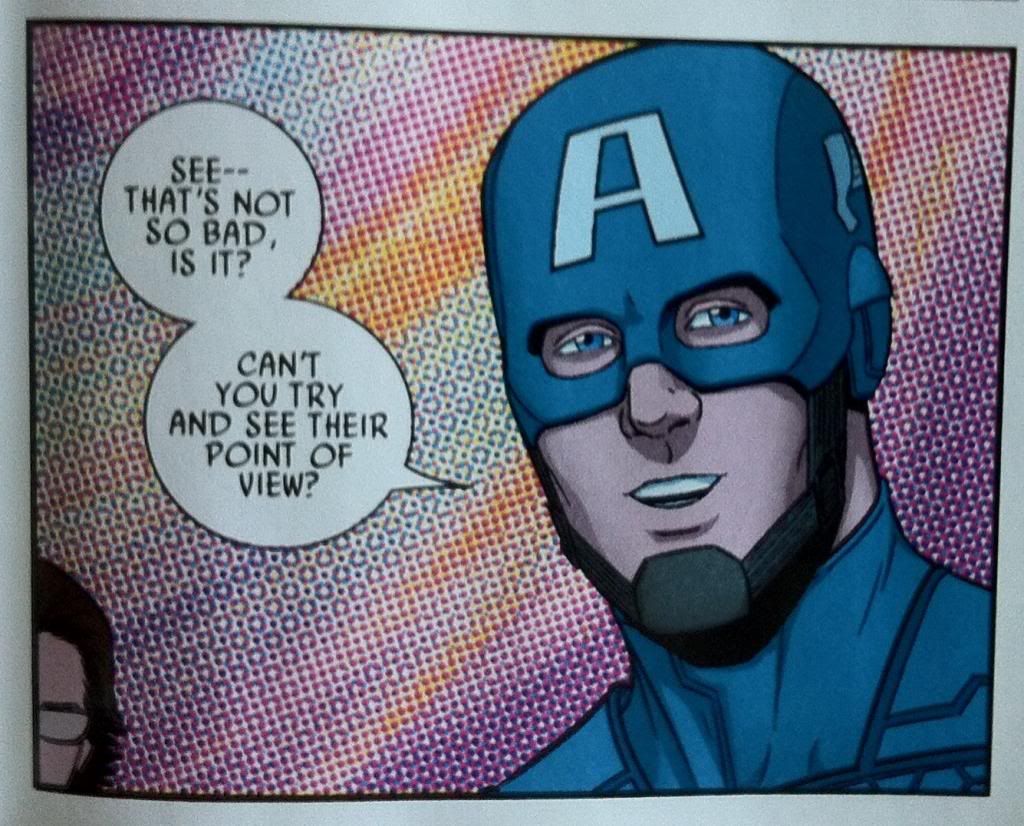
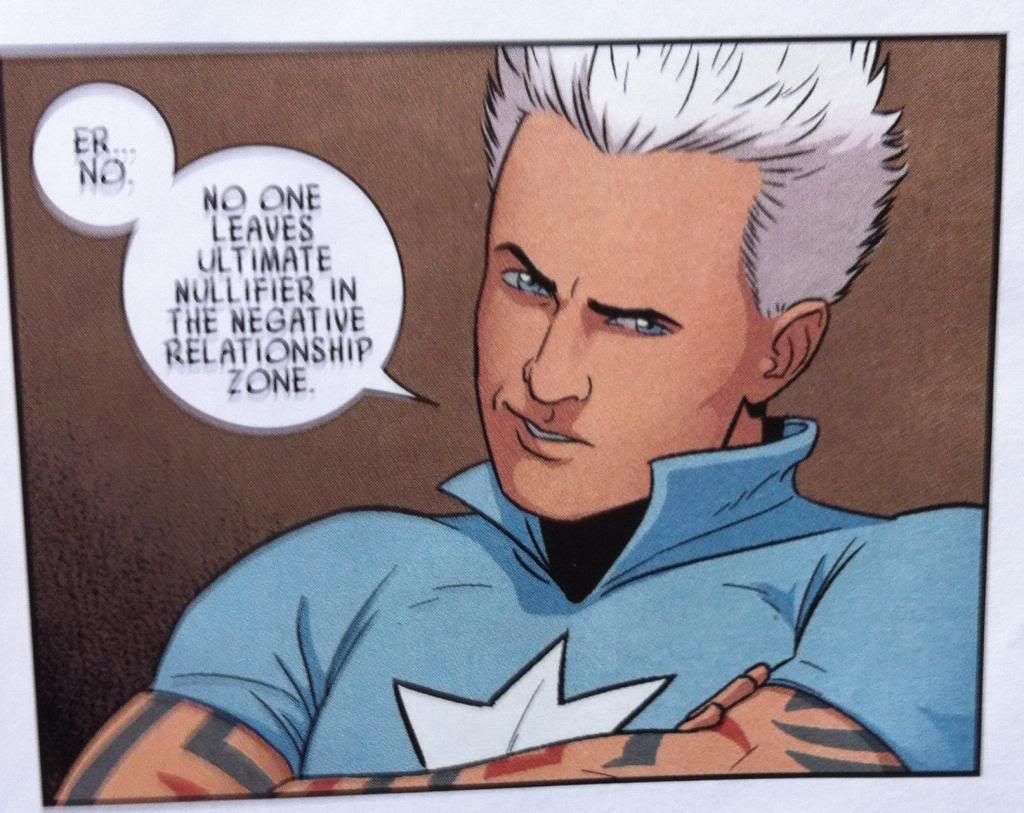
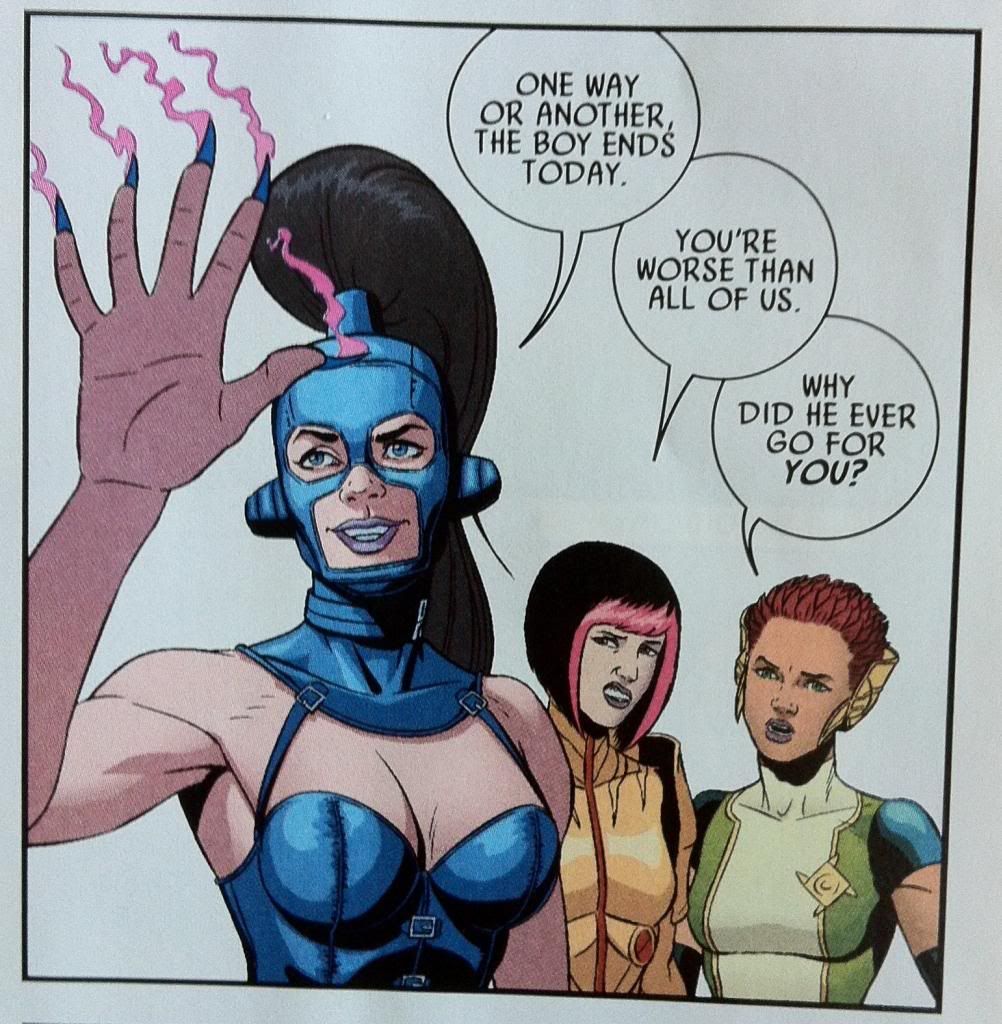
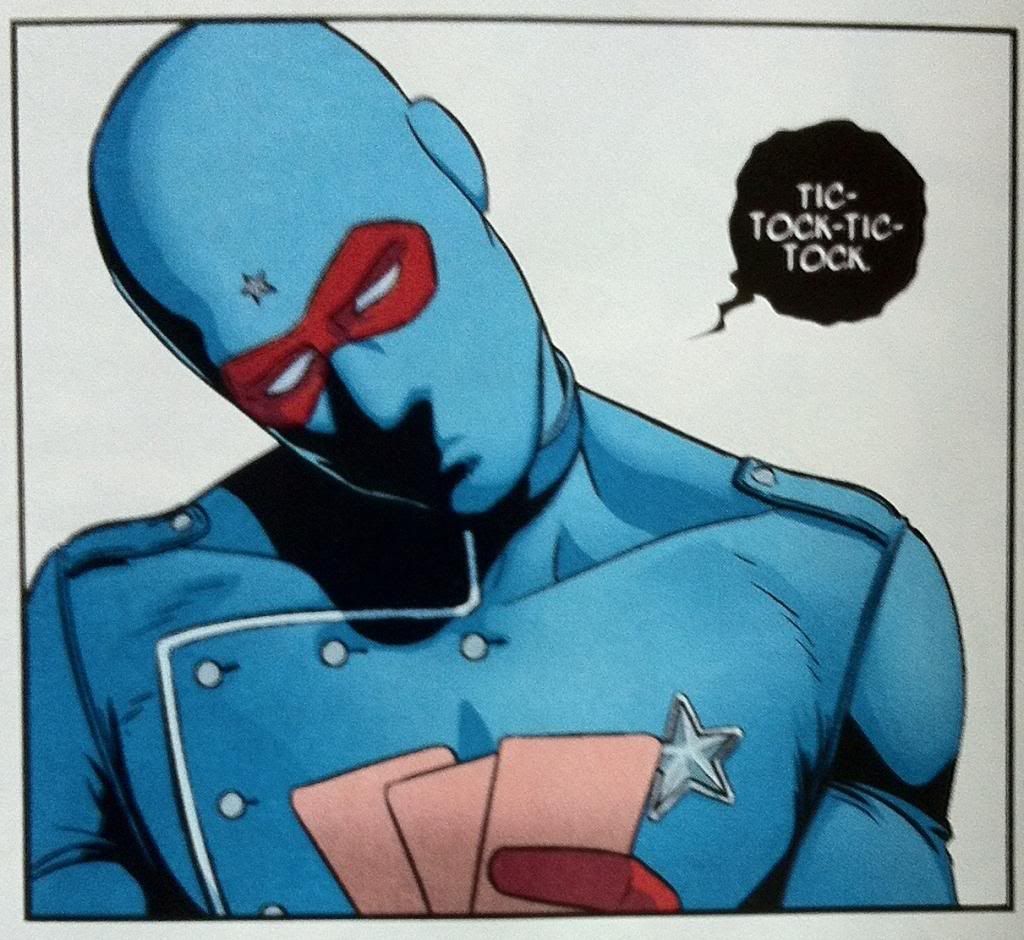
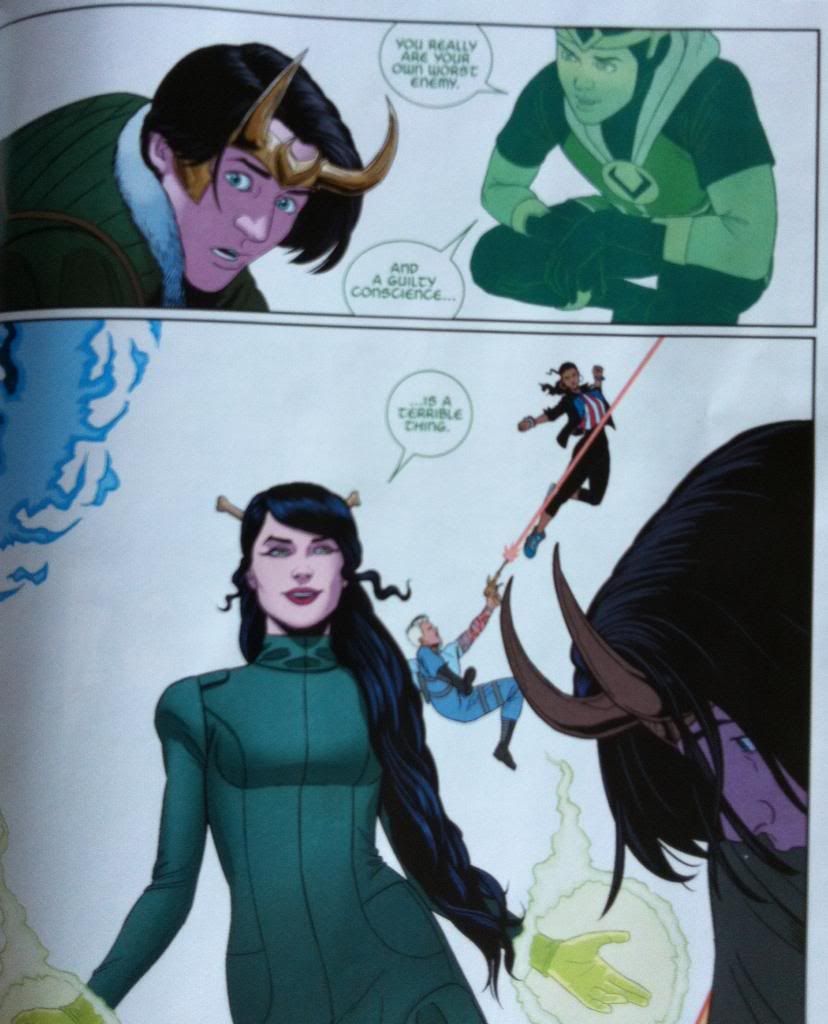

Holy crap, the evil exes thing totally fits, especially after I've been trolling (the boating kind) tumblr for the portion of the fandom that hates the current run. Holy crap holy crap. I wouldn't be surprised if this is what Gillen intended all along.
ReplyDeleteA note: could Patri-not also represent the fans who are just in abject denial of anything new. Like fans who heard about the negative things people were saying about the run and decided they were completely against change and advocated heavily that such a "disastrous" run would soon come to an end a la "Tic-Tock-Tic-Tock." It took Tommy from everyone in an attempt to "save" him from change and development, which would account for Tommy's reaction of sheer terror when he encountered it (being a speedster, standing still is probably the worst thing imaginable). I suppose all will be come clear when we find out who--or what--it actually is, hopefully by this week.
Brilliant as always
Thanks. I work under the assumption that if it is obvious enough for me to figure out, it has to be deliberate.
DeleteYeah... Patriot is tough. Your theory is as good as mine. I still think he is time/endings/change. Like, everyone (audience/critics/author) is in denial that things will change/end and that is inevitable. And maybe his stealing Speed, or that he is patriot, is like a nod that the old Young Avengers is already over and never coming back? But yeah, still not sure I've got it.